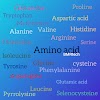What is Vitamin?.....Facts and Function of Vitamins
Or
A vitamin is an organic molecule that is an essential micronutrient which an organism needs in small quantities for the proper functioning of its metabolism.
The term vitamin is derived from the word vitamine, which was coined in 1912 by Polish biochemist Casimir Funk, who isolated a complex of micronutrients essential to life, all of which he presumed to be amines. Governments mandated addition of vitamins to staple foods such as flour or milk, referred to as food fortification, to prevent deficiencies. Recommendations for folic acid supplementation during pregnancy reduced risk of infant neural tube defects.
Vitamins are classified as either water-soluble or fat-soluble. In humans there are 13 vitamins: 4 fat-soluble (A, D, E, and K) and 9 water-soluble (8 B vitamins and vitamin C). Water-soluble vitamins dissolve easily in water and, in general, are readily excreted from the body, to the degree that urinary output is a strong predictor of vitamin consumption. Because they are not as readily stored, more consistent intake is important. Fat-soluble vitamins are absorbed through the intestinal tract with the help of lipids (fats). Vitamins A and D can accumulate in the body, which can result in dangerous hypervitaminosis. Fat-soluble vitamin deficiency due to malabsorption is of particular significance in cystic fibrosis.
Fast facts on vitamins :-
There are 13 known vitamins.
Vitamins are either water-soluble or fat-soluble.
Fat-soluble vitamins are easier for the body to store than water-soluble.
Vitamins always contain carbon, so they are described as “organic.”
Food is the best source of vitamins, but some people may be advised by a physician to use supplements.
Vitamins are grouped into two categories:
Fat-soluble vitamins are stored in the body's fatty tissue. The four fat-soluble vitamins are vitamins A, D, E, and K. These vitamins are absorbed more easily by the body in the presence of dietary fat.
There are nine water-soluble vitamins. They are not stored in the body. Any leftover water-soluble vitamins leave the body through the urine. Although, the body keeps a small reserve of these vitamins, they have to be taken on a regular basis to prevent shortage in the body. Vitamin B12 is the only water-soluble vitamin that can be stored in the liver for many years.
Some “vitamin-like factors” are also needed by the body such as:
Choline
Carnitine
Function-
Each of the vitamins listed below has an important job in the body. A vitamin deficiency occurs when you do not get enough of a certain vitamin. Vitamin deficiency can cause health problems.
Not eating enough fruits, vegetables, beans, lentils, whole grains and fortified dairy foods may increase your risk for health problems, including heart disease, cancer, and poor bone health (osteoporosis).
There are 13 essential vitamins. This means that these vitamins are required for the body to work properly. They are:
Vitamin B3 (niacin)
Pantothenic acid (B5)
Biotin (B7)
Vitamin B6
Vitamin B12 (cyanocobalamin)
Folate (folic acid and B9)






0 Comments